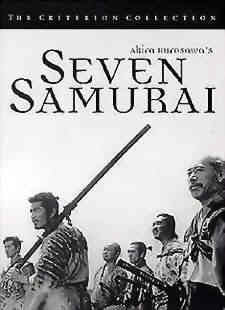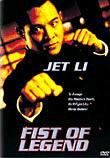|
Seven Samurai (1954)

Starring: Takashi Shimura, Toshiro Mifune
Director: Akira Kurosawa
MPAA: not rated
It is almost impossible to discuss the Samurai in movies without mentioning the work of the great Akira Kurosawa. Kurosawa
made many samurai films, all of them magnificent works but the one gem which is said to outshine them all is Seven Samurai.
It's a classic story of good vs. evil, honor, duty, compassion, and sacrifice. Set in feudal Japan, it tells of a small village
terrorized by roaming, plundering thieves. In desperation, the farmers go into town to find masterless samurai to help them.
Having no currency except rice, the village elder tells them simply: "find hungry samurai." It is here that Kurosawa's talent
for character development shines as we meet all manner of samurai from unreliable drunkards to proud and stoic warriors enraged
at the peasant's meager offer of employment. Soon a group of seven comes together in an unlikely alliance. The first is the
humble yet dignified Kambei Shimada (played by Takashi Shimura) who sets out to gather the rest- including the coarse and
impetuous Kikuchiyo, played by Toshiro Mifune. Mifune, who stars in many of Kurosawa's films as a proud, brave and heroic
sort of samurai is almost unrecognizable as Kikuchiyo, who is a wild combination of Shakespeare's Falstaff and George Lucas'
Han Solo. He mugs, cackles, and brandishes a massive sword with dubious skill. Together the seven fortify the village and
prepare for a showdown from which some will not emerge alive. Kurosawa portrayed samurai as they really were- men struggling
to be civilized in a hard and harsh time. The battles are raw, frantic and dangerous-looking. There is no flamboyant swishing
of blades and spinning about Highlander-style. In Kurosawa's films, fighting is dirty business not worthy of idealizing. Kurosawa's
masterful compositions, and brilliant use of contrasts and mood make me wonder why filmmakers ever bothered with color. There
are images within this film which will become emotionally-charged still-life paintings in your mind which will remain for
years after viewing it. Highly recommended for any fan of samurai history.
|
 |
 |
 |
Ghost Dog: The Way of the Samurai (2000)

Starring Forest Whitaker
Director: Jim Jarmusch
MPAA: R (for violence and language)
Ghost Dog is one of those rare films I am drawn to again and again. It's a sublime mix of a modern black "gangsta" film
(which I normally dislike), old-time "gangster" film, and meditative "Samurai" film. The result is a moody, sometimes melancholic,
sometimes darkly comic experience. Forest Whitaker plays Ghost Dog, a solitary man who lives on the rooftop of an abandoned
building. His humble shack contains everything he needs for his simple life as a contract killer for a local mobster. Years
before, this mafioso had saved young Ghost Dog's life. Ghost Dog shows up years later and pledged his servitude to the mobster,
becoming his samurai. With a copy of Hagakure, The ancient Book of the Samurai as his guide, Ghost Dog finds his place
amid the careless brutality, mindless prejudice, and overall chaos of modern life. True to the samurai way, he is loyal to
his employer without judging or condoning what is taking place around him. It's an interesting, poetic story of consequences
and karma. The symbolisms and nuances of this film are too numerous to fully discuss here but interwoven within the story
is Ghost Dog's friendship with a little girl who, like him, finds consolation and happiness in books. His only other friend
is a French-speaking ice cream vendor. They carry on entire conversations, neither knowing exactly what the other is saying,
but communicating beautifully. The fairly good hip-hop soundtrack and Forest Whitaker's readings from Hagakure which
corresponds to the events on the screen, set the mood beautifully. Overall this is an excellent movie, sometimes endearing,
sometimes haunting and tastefully done in a slightly urban fairy-tale flavor. The experience is a rich one and watching the
film several times may be required to get it all. I, personally, have no problem with that whatsoever.
|
 |
 |
 |
|
Fist of Legend (1994)

Starring Jet Li
Directed by Gordon Chan
MPAA: R (for violence)
At first glance it seems you just can't go wrong with this movie for three very obvious reasons.
1: Jet Li. He's probably the most talented martial artist in cinema today- if not the world, bar NONE. 2: Fight
choreography by Yuen Woo-Ping . He choreographed The Matrix and Crouching Tiger, Hidden Dragon. His talent for dynamic,
flowing fight scenes wows even the most jaded martial arts movie buff. 3: It's a re-make of Bruce Lee's Fist of Fury.
This legendary film's raw, electrifying fights influenced martial arts films for decades. This last factor could EASILY have
been the film's downfall but Director Chan masterfully captures the essence of the original and retells the story in an engaging,
magnetic way. The story takes place just before World War II when tensions ran high between the Chinese and Japanese. Li is
Chen Zhen, a Chinese student attending school in Japan. Here he learns that his master back home is killed in a duel with
the head of a rival Japanese dojo. Zhen returns to the Japanese occupied Shanghai to dole out some major tail-kicking and
discovers a plot to destroy his beloved master's school. The fight sequences have a sublime beauty I have not seen in quite
some time and there's barely a touch of the chop-sockey cheesiness which plague Golden Harvest martial arts films. The film
is enriched by several key elements such as the Romeo-and-Julietesque romance between Zhen and a Japanese girl and the tensions
between Zhen and the girl's benevolent uncle Fumio who is an instructor of a Japanese dojo. The underlying message of dignity
and peace underscore the violent confrontations. This film is a must-see for any martial artist.
|
 |
|
|
|

